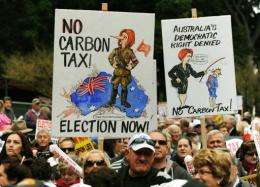Protesters hold placards as they attend a no carbon tax rally in Sydney on July 1, 2012. Australia's new carbon tax received a cool reception in a poll Monday, showing Prime Minister Julia Gillard's mechanism to tackle climate change is unpopular and her government on track to lose office.
Australia's new carbon tax received a cool reception in a poll Monday, showing Prime Minister Julia Gillard's mechanism to tackle climate change is unpopular and her government on track to lose office.
Only 33 percent support the measure introduced Sunday, according to the Nielsen survey published in the Sydney Morning Herald, with 62 percent of the 1,400 voters polled opposing it.
The centre-left Labor government has launched a drive to sell the carbon tax, which imposes a levy of Aus$23 (US$23.50) per tonne of carbon emissions on about 350 of the country's top polluters.
Gillard's party was well behind the conservative opposition led by Tony Abbott, with percentage support split 42-58 between them once minor parties' shares were stripped out.
Protesters march during a no carbon tax rally in Sydney on July 1, 2012. Australia has introduced a controversial carbon tax in a bid to tackle climate change, with Prime Minister Julia Gillard hailing the move amid opposition warnings it will stifle industry.
Australia, one of the world's highest carbon emitters per capita, has long debated taxing such pollution, but the issue remains hugely divisive and has sparked large protests.
The prime minister said Monday it could take months to change opinion.
"There has been a hysterical fear campaign from the doomsday merchants who have tried to convince people over the last 12 months... that we'd see, for example, the coal industry go out of business," Gillard told ABC Radio.
"I think we will see people in the months to come, working out what carbon pricing is meaning for them, and working out what it is meaning for the nation."
Gillard's measure involves a fixed price for the first three years before switching to a market-based emissions trading scheme similar to that of the European Union.
The opposition has claimed that businesses will pass on the cost to consumers, raising the cost of living, and argues it will also hurt the booming resources industry.
"The whole point of this carbon tax... is to kill off the coal industry, kill off the gas industry, and over time to switch entirely to renewables," Abbott said.
"Now, the problem with switching entirely to renewables is that they are vastly more expensive."
(c) 2012 AFP
























